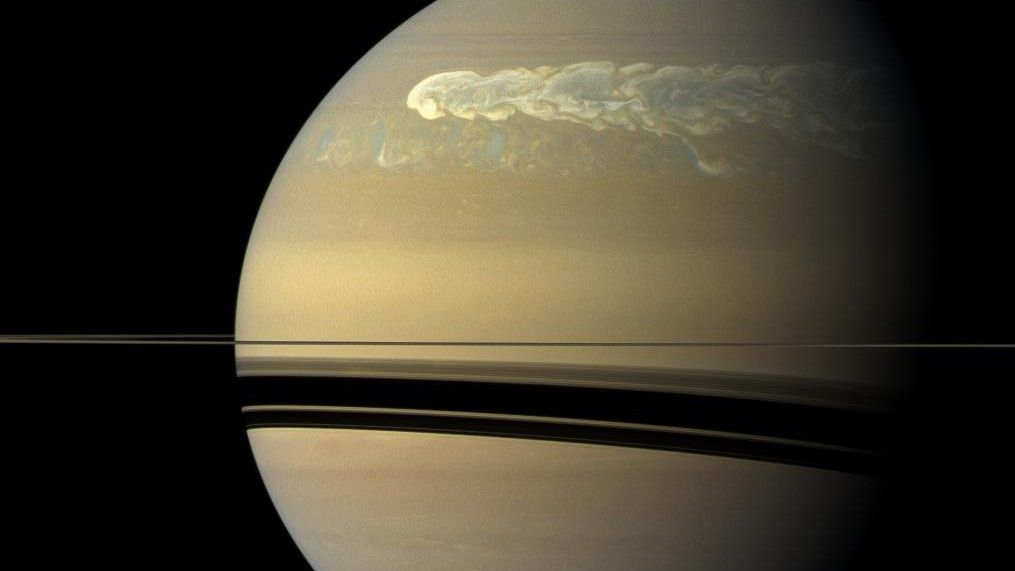Science
Related: About this forum100-year-long 'megastorms' on Saturn are creating radio signals that scientists can't fully explain
By Brandon Specktor published about 13 hours ago
Gargantuan storms on Saturn can wrap around the entire planet and be seen for months. New research suggests their impacts persist hundreds of years longer than experts thought.

A closeup of the 2010 megastorm that formed in Saturn's northern hemisphere, wrapping around the entire planet
A closeup of the 2010 megastorm that formed in Saturn's northern hemisphere, wrapping around the entire planet (Image credit: NASA/JPL-Caltech/Space Science Institute)
Imagine a thunderstorm so massive that its dark outline wrapped around the entire planet.
Such terrifying "megastorms" are common on Saturn. Also called "Great White Spots," they erupt once every 20 or 30 years in the planet's northern hemisphere and rage nonstop for months. Astronomers have spotted six of these planet-wide storms whipping around on Saturn since 1876. The most recent storm struck in December 2010, when NASA's Cassini spacecraft happened to be orbiting the planet, snagging a front-row view of the megastorm's entire 200-day life span.
Now, new research into the epic 2010 storm has found that those 200 days of thunder were just a few drops in a much bigger, weirder meteorological bucket. According to recent radio telescope scans, the ongoing impacts of megastorms that erupted on Saturn more than 100 years ago are still visible in the planet's atmosphere today, and they left behind persistent chemical anomalies that scientists can't fully explain.
In other words, long after a megastorm fades from view, its impact on Saturn's weather lasts centuries.
"For most of the time, Saturn's atmosphere looks hazy and featureless to the naked eye in contrast to Jupiter's colorful and vibrant atmosphere," the researchers wrote in a study published Aug. 11 in the journal Science Advances. "This picture changes when we look at Saturn using a radio eye."
More:
https://www.livescience.com/space/saturn/100-year-long-megastorms-on-saturn-are-creating-radio-signals-that-scientists-cant-fully-explain
Easterncedar
(2,373 posts)Really fascinating. Thanks, Judi Lynn
GreenWave
(6,829 posts)Effete Snob
(8,387 posts)Maybe it's just me, but these headlines are pretty consistent and all seem to have the intent of portraying "scientists" as unimaginative buffoons.
It's always, "Scientists Baffled", mystified, astounded, etc.., as if the daily work of science involves explaining every phenomenon or observation at the drop of a hat, and they are never quite up to the task.
This one is classic "scientists can't fully explain".... well, duh. Science does not purport to "fully explain" anything in the first place. Science deals in structured observation and hypothesis testing of physical phenonema, and then formulating theories that are accurate under stated conditions and limitations.
But, and this became clear during the covid pandemic, there is some psychological need to deride scientists, collectively, in these supposed "science news" headlines with a constant barrage of suggestions that they don't know what they are doing.
Why is that?